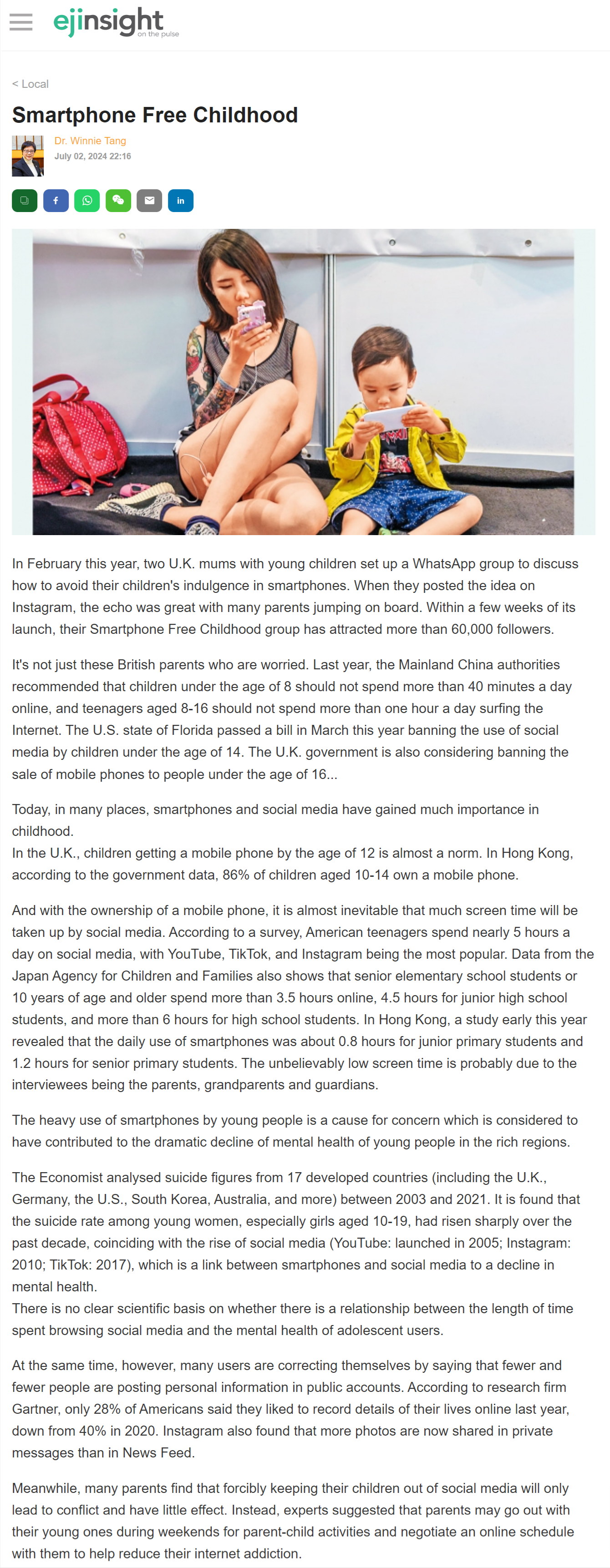網上版請按此

Smartphone Free Childhood
In February this year, two U.K. mums with young children set up a WhatsApp group to discuss how to avoid their children's indulgence in smartphones. When they posted the idea on Instagram, the echo was great with many parents jumping on board. Within a few weeks of its launch, their Smartphone Free Childhood group has attracted more than 60,000 followers.
It's not just these British parents who are worried. Last year, the Mainland China authorities recommended that children under the age of 8 should not spend more than 40 minutes a day online, and teenagers aged 8-16 should not spend more than one hour a day surfing the Internet. The U.S. state of Florida passed a bill in March this year banning the use of social media by children under the age of 14. The U.K. government is also considering banning the sale of mobile phones to people under the age of 16...
Today, in many places, smartphones and social media have gained much importance in childhood. In the U.K., children getting a mobile phone by the age of 12 is almost a norm. In Hong Kong, according to the government data, 86% of children aged 10-14 own a mobile phone.
And with the ownership of a mobile phone, it is almost inevitable that much screen time will be taken up by social media. According to a survey, American teenagers spend nearly 5 hours a day on social media, with YouTube, TikTok, and Instagram being the most popular. Data from the Japan Agency for Children and Families also shows that senior elementary school students or 10 years of age and older spend more than 3.5 hours online, 4.5 hours for junior high school students, and more than 6 hours for high school students. In Hong Kong, a study early this year revealed that the daily use of smartphones was about 0.8 hours for junior primary students and 1.2 hours for senior primary students. The unbelievably low screen time is probably due to the interviewees being the parents, grandparents and guardians.
The heavy use of smartphones by young people is a cause for concern which is considered to have contributed to the dramatic decline of mental health of young people in the rich regions.
The Economist analysed suicide figures from 17 developed countries (including the U.K., Germany, the U.S., South Korea, Australia, and more) between 2003 and 2021. It is found that the suicide rate among young women, especially girls aged 10-19, had risen sharply over the past decade, coinciding with the rise of social media (YouTube: launched in 2005; Instagram: 2010; TikTok: 2017), which is a link between smartphones and social media to a decline in mental health.
There is no clear scientific basis on whether there is a relationship between the length of time spent browsing social media and the mental health of adolescent users.
At the same time, however, many users are correcting themselves by saying that fewer and fewer people are posting personal information in public accounts. According to research firm Gartner, only 28% of Americans said they liked to record details of their lives online last year, down from 40% in 2020. Instagram also found that more photos are now shared in private messages than in News Feed.
Meanwhile, many parents find that forcibly keeping their children out of social media will only lead to conflict and have little effect. Instead, experts suggested that parents may go out with their young ones during weekends for parent-child activities and negotiate an online schedule with them to help reduce their internet addiction.
Dr. Winnie Tang
Adjunct Professor, Department of Computer Science, Faculty of Engineering; Department of Geography, Faculty of Social Sciences; and Faculty of Architecture, The University of Hong Kong